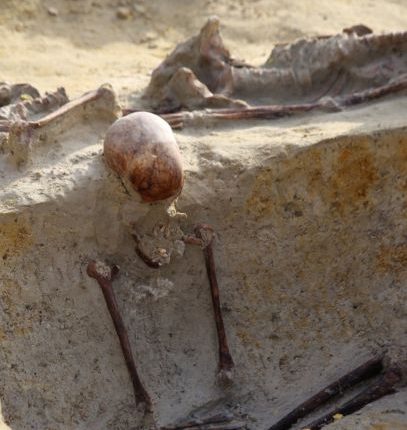Skeleton with shattered skull among 240 bodies uncovered at Chemmani mass grave
COLOMBO – The second phase of excavations at the Chemmani–Sindhubathi mass grave in Jaffna has concluded, revealing at least 240 human skeletons, including the remains of children, infants, and bodies found in overlapping positions, in one of the island’s largest ever mass graves.
Excavations were conducted across two sites, designated as Site 01 and Site 02, over a period of 54 days. At Site 01 alone, investigators dug a trench measuring approximately 30 feet wide, 50 feet long, and 5 feet deep under the supervision of Jaffna Additional Magistrate Selvanayagam Lenin Kumar.
In the final days of work, excavators uncovered a smaller skeletal assemblage lying across the knee region of two larger skeletons, while another skull was found in contact with a shoulder blade. These discoveries mark the fourth time in recent weeks that overlapping remains have been identified, with skeletons frequently recovered in superimposed positions.
Among the most striking findings was a skeleton unearthed last Friday (5), seated cross-legged with its hands bound. The body’s head was tilted slightly downward to the right, with a fractured skull and shattered jawbone.
Other discoveries included the skeletal remains of children and infants, as well as bodies found heaped together in piles.
The Chemmani graves have long been tied to allegations of extrajudicial killings carried out by the Sri Lankan army during its occupation of Jaffna in the mid-1990s. In 1998 a Sri Lankan soldier on trial for rape and murder testified that hundreds of Tamils had been secretly buried there. Since the more recent excavations, the soldier has agreed to testify before an international tribunal.
More than two decades later, successive excavations have confirmed the presence of vast numbers of bodies, reinforcing Tamil families’ calls for international accountability.
Despite the gruesome discoveries, there has been no accountability for the massacres linked to Chemmani. Successive Sri Lankan governments have blocked international involvement in investigations, insisting on domestic mechanisms that Tamils and rights groups say lack independence and credibility.
The conclusion of the second phase, with 240 skeletons now identified and 239 full exhumed, has intensified demands from survivors and campaigners that Sri Lanka be referred to the International Criminal Court (ICC) and that Chemmani, like Mullivaikkal, be recognized internationally as evidence of genocide.
-TG



Comments are closed, but trackbacks and pingbacks are open.